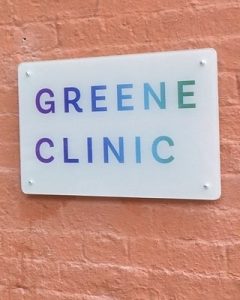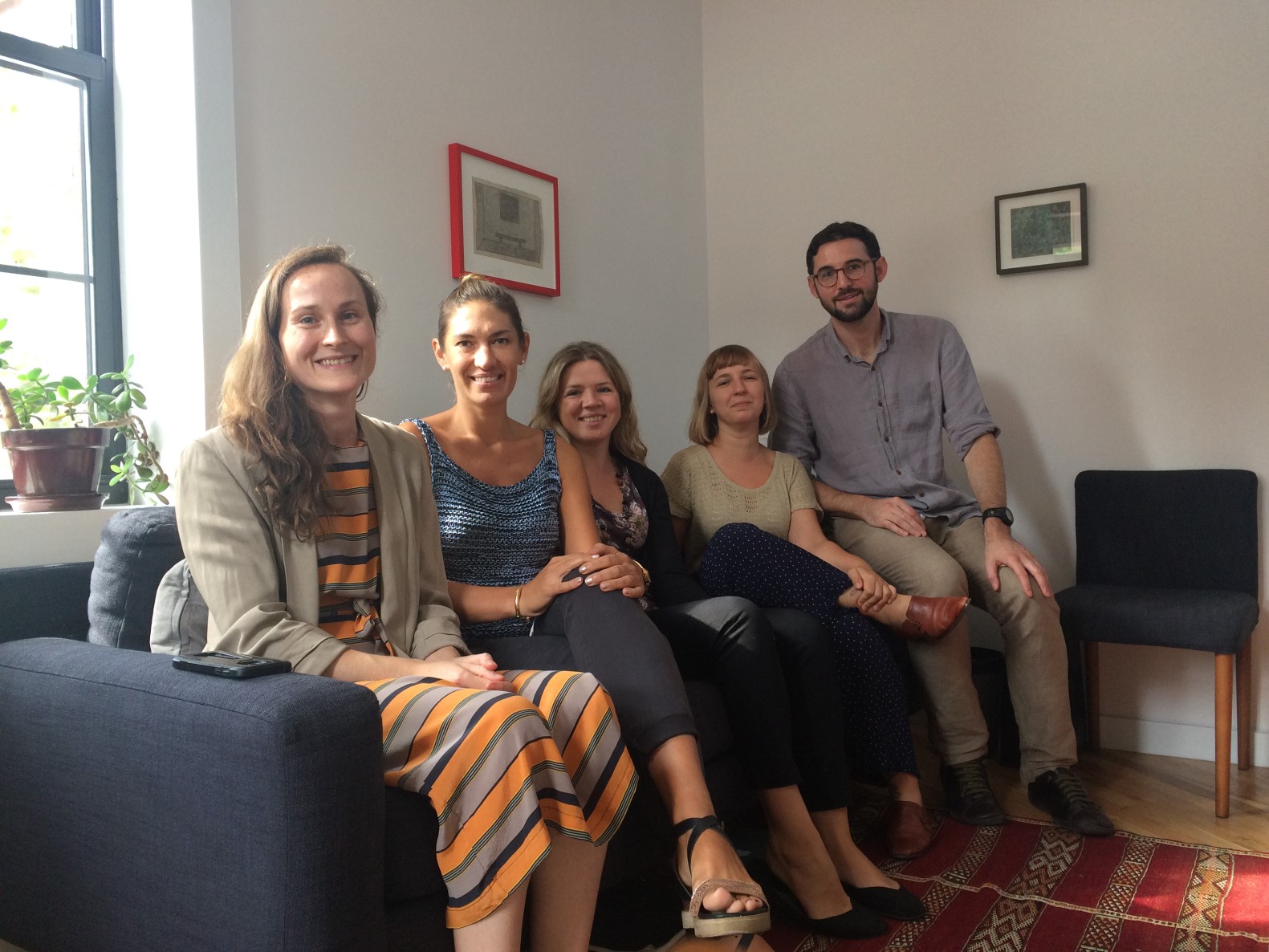In her internship, postdoc training, and early career, Dr. Cassie Kaufmann (Ph.D., 2014) kept her mind open re-garding her future. She spoke with col-leagues about creating a space for col-laboration with like-minded clinicians and reflected on the need for more postdoc training opportunities (and equity in postdoc compensation).
In her internship, postdoc training, and early career, Dr. Cassie Kaufmann (Ph.D., 2014) kept her mind open regarding her future. She spoke with colleagues about creating a space for collaboration with like-minded clinicians and reflected on the need for more postdoc training opportunities (and equity in postdoc compensation). She also thought about the difficulty patients experience when seeking high-quality but affordable psychotherapy, especially in Brooklyn, where she lives.
Out of these different currents (and with a contribution from the appeal of working close to home), the Greene Clinic was born in January 2018.
Located in the neighborhood of Fort Greene (89 Fort Greene Place, 2nd Floor), the Greene Clinic provides individual, couples, and group psycho-therapy, as well as psychiatric consultation, art therapy, and Chinese medicine (including acupuncture, herbal medicine, and qigong). Additionally, the Greene Clinic is also preparing to offer psychological assessment services in the near future. This range of services emerged from the connections and interests developed by Dr. Kaufmann in her training and early career. She met the psychiatrists and art therapist working at the Greene Clinic during her time as an intern and later staff psychologist at Columbia Medical Center, and she became familiar with acupuncture while a postdoc at Madison Park Psychological Services.
Describing the clinic’s origin, Dr. Kaufmann said, “I became friends with one of the residents who also thought it would be really nice to open up a group practice with people from different fields, but interested in similar theories and interested in community and politics.” She added that they desired “to see how we could integrate the different disciplines and offer a range of services to people,” and wanted to do so using a sliding scale model to make treatment more widely accessible.
With regard to providing training opportunities, Dr. Kaufmann is sensitive to the challenges of being a post-doc based on her experiences and those of friends.
Speaking to this sensitivity and her vision for the Greene Clinic, she said, “There aren’t a lot of spaces to get hours in a more formal way. There are a couple of solid positions, where you get benefits and full-time hours, but a lot of people end up cobbling together places. People in training often get exploited for their labor. We wanted to provide a space where people could also make some money. People aren’t making a killing here, but at least they should get a reasonable wage for contributing a lot of hours and effort.”

All of the postdocs at the Greene Clinic so far have been Derner graduates. Laura Eidlitz (Ph.D., 2017) was the first postdoc to start at the Greene Clinic, and she has since been joined by Danny Sims (Ph.D. expected 2019), Nadia Kuprian (Ph.D., 2018), and Inga Korsgaard (Ph.D., 2018). Additionally, Derner graduates Gabriella Cardona-Morales (Ph.D., 2014), Sophia Frydman (Ph.D., 2016), and Jenny Marion (Ph.D., 2016), as well as current doctoral candidate Antonia Frydman (Ph.D. expected 2020), also provide clinical services at The Greene Clinic.
When conceptualizing the Greene Clinic, Dr. Kaufmann also drew upon her experiences as an extern at The Village Institute and a postdoc at Madison Park Psychological Services. At these sites, she learned “how to do the business end… Negotiating fee, scheduling, submitting claims, dealing with insurance.” She also gained exposure to the sliding scale fee model at The Village Institute and observed how a postdoc position could prepare a psychologist for private practice through her time at Madison Park Psychological Services.
The Greene Clinic’s first year has been a success. Dr. Kaufmann reports “The word is getting out. People are finding their way to us, slowly but surely. And the people who are interested are very pleased to find a place where they can go in Brooklyn, where there’s flexibility in fee, so that they feel they can afford it.” Additionally, Dr. Kaufmann is hopeful that the postdocs and staff will form a supportive professional community. Though it is still early, thus far signs point to this type of network developing at the Greene Clinic through group supervision, postdoc didactics, and the informal interactions that come from sharing space and clinical interests.
The launching of the clinic has not been without challenges, specifically the learning curve that comes along with management, accounting, and real estate aspects of clinic leadership, as well as overseeing triage and assignment of cases.
“It’s one thing to be self-employed and another to incorporate and then to start taking on employees. That’s been a steep learning curve. Figuring out all the bureaucratic stuff, and then figuring out the new role. Figuring out how to feel self-authorized as a private practitioner but also as a supervisor when I’m not that many years ahead of the people who I’m supervising. It’s been very growth-filled, but it’s been a lot of work” said Dr. Kaufmann.
Looking to the future, Dr. Kaufmann described her wish to continue developing a community at the Greene Clinic. “I hope there continue to be trainees who are excited to be part of the group and that the patients get a good experience. And that we continue to enjoy working with each other” she said. She also hopes clinicians at the Greene Clinic will branch out, describing a hope that “we find more space to be creative together” and a hope “to create opportunities for clinicians to feel like they can be experimental.” For example, Dr. Kaufmann is interested in finding ways to make psychotherapeutic experiences available to the community in times of crisis, such as one-day workshops or short-term groups, but logistical questions remain to be worked out.

When asked if she had any advice for current doctoral candidates, Dr. Kaufmann spoke about bringing ourselves to our work, being experimental, and maintaining connections with other professionals, saying, “I’d encourage people to take risks in different ways. It doesn’t necessarily have to be financial. Especially when you’re just coming out of training, I feel like the postdoc years can be a nice time of figuring out, in a more grounded way, how do you want to practice? Who do you want to work with? How do you want to develop your community? And to give that time and space to unfold. I think that’s been part of it for me, figuring out how I want to practice. Leaving a hospital setting where I was working with so many other people but in a short-term model. I loved working with people from other disciplines, so it’s nice to be able to continue that at the Greene Clinic.”
In closing, it appears that the creation of the Greene Clinic offers an example of a psychologist recognizing an opportunity and creatively taking the steps to establish a space reflective of her own commitments and interests. Dr. Kaufmann cites her past advisor, Dr. Joe Newirth, who spoke about using the postdoc experience and early career to figure out what type of practice and career she would have. As students, it can feel that we are entering a pre-established landscape, but Dr. Kaufmann’s establishment of the Greene Clinic shows that we can also take steps to shape that landscape. It takes courage (and support) to risk doing something new, but if we draw from the accumulated wisdom that comes to us in our training, a calculated risk can payoff.
To learn more about the Greene Clinic, visit the website http://www.greeneclinic.com/. Individuals seeking to make a referral for psychological ser-vices, as well as recent graduates interested in a postdoctoral position can contact Dr. Kaufmann at info.greeneclinic@gmail.com or 646-470-1853.For further information, please contact:
Todd Wilson
Strategic Communications Director
p – 516.237.8634
e – twilson@adelphi.edu